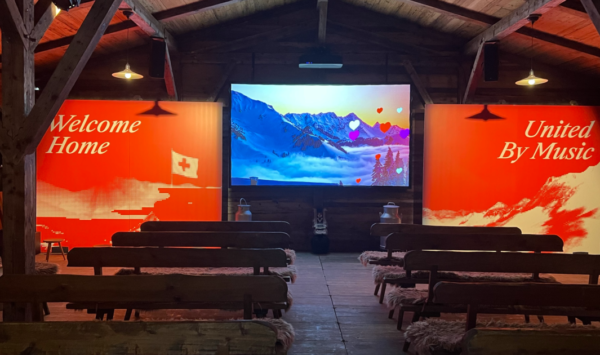The 2025 Eurovision Song Contest in Basel is well and truly underway, with the first individual rehearsals for the semi-finalists completing today. The EBU has ensured a safe, healthy and positive experience for the competing acts.
The EBU and the Reference Group have worked round the clock along with the competing delegations to ensure a safe and happy environment for the competing acts.
All competing acts are welcome to a Swiss Chalet upon arrival and greeted by the ESC 2025 producers Reto Peritz and Moritz Stadler
This year sees numerous changes to the rehearsals format and the way things run behind the scenes as the EBU has implemented the Code of Conduct and a Duty of Care Protocol.
Both the first and second individual artist rehearsals are being held behind closed doors with no media present. Accredited media will be only allowed to access the venue during the first dresss rehearsals and the 3 public shows (with a valid ticket).
Camera free zones have been implemented to ensure the competing acts have their privacy. The Eurovision rehearsals schedule have been optmised to give the competing acts more free time to rest and discover the beautiful host city of Basel.
The first dress rehearsals will enable media to be present with a restriction: no filming or photograping will be allowed.
The press conferences for the qualifying acts after the semi-finals have been eradicated.
The EBU’s official press release reads:
This year’s Contest marks a significant shift in how the EBU and Host Broadcaster SRG SSR approach the artists’ experience.
When arriving on site for the first time all delegations are greeted in a special Swiss-chalet style Welcome Pavilion designed by Artur Deyneuve & Alain Fiechter. There they meet key staff including this year’s Executive Producers, Reto Peritz and Moritz Stadler and watch a video that covers all essential information they need about their time at the event.
Additionally, a dedicated Welfare Producer has been appointed to serve as a central point of contact for delegations, ensuring their wellbeing and providing a safe, supportive, and respectful environment for artists throughout their Eurovision journey.
Rehearsal schedules have also been optimized to allow participants more time to rest and explore Basel, while “camera free zones” have been established, to give artists and delegations clarity on when and where they can be filmed and record content. All media filming must first have the consent of the artist and the Head of Media for the respective participating delegation
All dressing rooms are in a no camera zone to create a peaceful atmosphere in which artists can prepare for their performances.
Filming has been limited in more rehearsals as well to give artists the space they need to focus and perfect their acts without public scrutiny.
The first time the artists rehearse on stage they are doing so safe in the knowledge that they will not be filmed by anyone while they get used to the stage.
Fans are getting the first taste of the 37 performances with still photography released after the rehearsal following approval from the artist and their delegations.
Short excerpts from the second artist rehearsals will be shared on the Contest and broadcasters’ digital channels so fans and media can see the final performances taking shape.
The first Dress Rehearsal for each live show is open to onsite accredited media, so they can prepare their coverage and see the finished performances onstage for the first time, but no filming or photography is permitted and it won’t be streamed in the Media Centre or Online Media Centre.
Again the priority is ensuring the artists can perform in the first full run through of each show, safe in the knowledge that their full performances will not appear in public until audiences arrive for the second and third dress rehearsals.
In a change to recent years, media conferences following the Semi-Finals have been reformatted, following requests from delegations to shorten the time artists need to be on site on the longest days of the event. All accredited media will now be able to access and use short reaction interviews with all the qualifying artists, and those from the Big 5 and hosts Switzerland who perform in each Semi-Final out of competition.
All these changes reflect recommendations from the ESC Reference Group—the event’s governing body—following a comprehensive review of the 2024 Contest in Malmö which included consultations with all 37 of last year’s participating broadcasters.
The EBU’s official press release continues:
Two key documents introduced this year, a Code of Conduct and a Duty of Care Protocol, now form the foundation of the Contest’s approach to wellbeing. Adhering to the Code of Conduct is a mandatory condition for all accredited individuals in Basel, underlining the EBU’s commitment to fostering a culture of respect, professionalism, and inclusion.
The Duty of Care Protocol specifically outlines the shared responsibility of the EBU, Host Broadcaster, and Participating Broadcasters in protecting artists from avoidable stress and ensuring their safety and wellbeing throughout the event. Heads of Delegation have been given clear guidelines to help support their artists and minimize risks during the demanding Contest period.
Martin Green CBE (Director of Eurovision) says:
As the first rehearsals get underway in Basel, we are reminded that the artists are at the heart of everything we do. These enhancements are not only about improving the show—but about creating an environment where creativity can thrive, and people feel genuinely supported.
Bakel Walden (Chair of the ESC Reference Group) says:
This is an important evolution for the Eurovision Song Contest. The changes being implemented in 2025 are a vital step toward ensuring this global event evolves responsibly, with artist experience at its core. We are proud to be shaping a Contest that reflects the values of its origins in our modern world.




